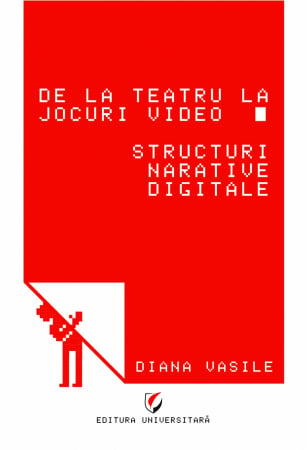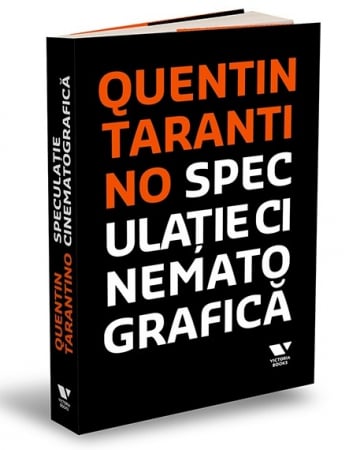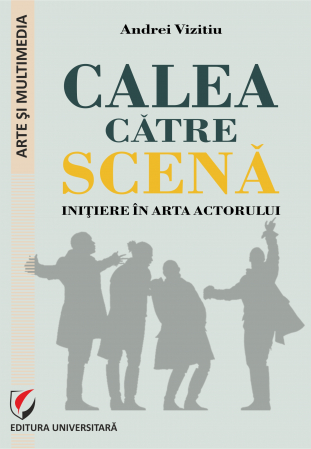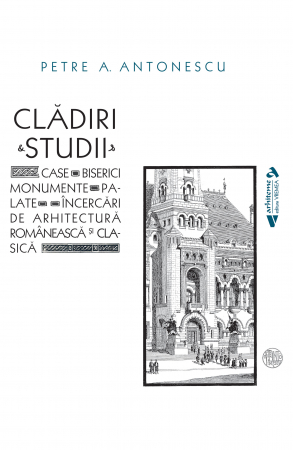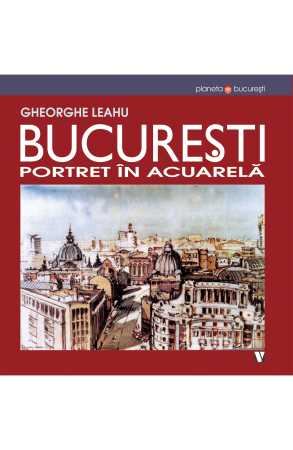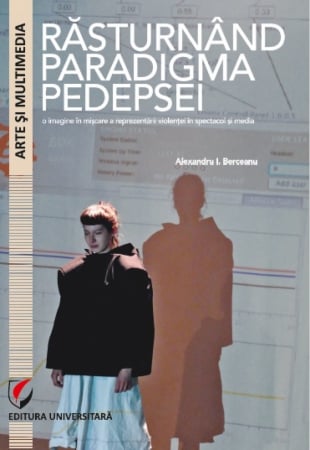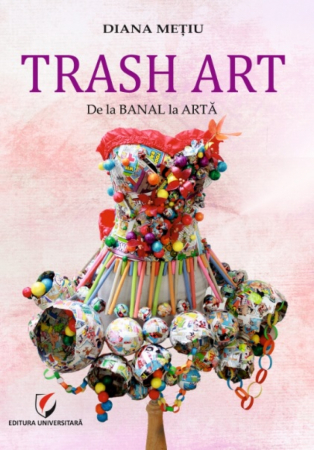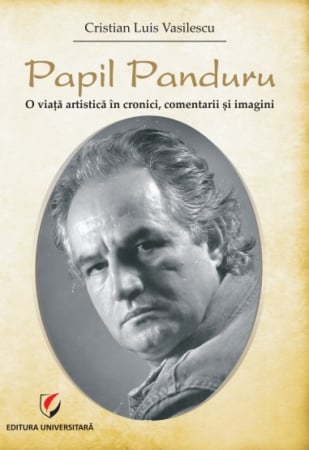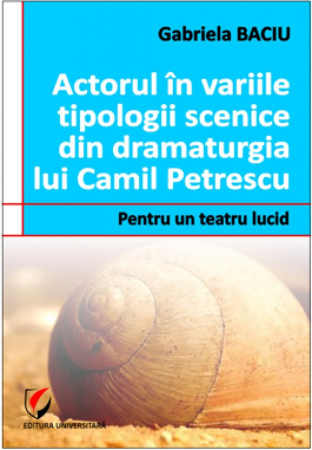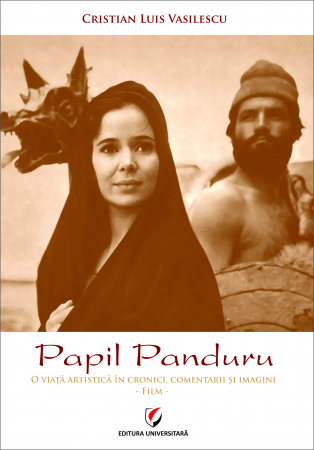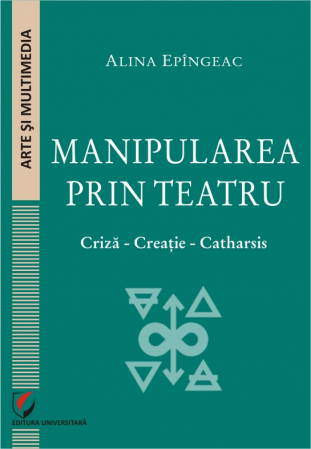Manuscript proposals: [email protected] / 0745 204 115 //// Tracking orders Individuals / Sales: 0745 200 357 / Orders Legal entities: 0721 722 783
Volume awarded with the THIRD PRIZE within the Manuscript Contest FULFILL A DREAM - SCIENTIFIC BOOK section
ISBN: 978-606-28-1320-8
DOI: 10.5682/9786062813208
Publisher year: 2021
Edition: I
Pages: 230
Publisher: Editura Universitară
Author: Ion Manzatu
Product Code:
9786062813208
Do you need help?
0745 200 357
- Description
- Download (1)
- Authors
- Content
- More details
- Reviews (0)
The play, as Chekhov's Seagull was nicknamed, keeps the first mystery fresh, arousing today's connoisseurs of Chekhov theater lovers. Caught in a dispute with presumptuous people who can no longer, for reasons easily understood, give the answer, the author of this book reveals arguments resistant to the weather of possible critical opposition, finding, where several decades of show have left as a model stereotypes of scenic interpretation, mechanisms of rejection of common, comfortable judgment. To this demonstrative purpose, the author devotes much eloquence, and the purpose itself can be sent in an unequivocal sentence: writing The Seagull, Chekhov gave us a comedy he insisted more than once on the idea of comedy desperately trying to convince performers at the Aleksandrinski Theater in Petersburg, at the Moscow Art Theater that what he had written was to remain a comedy on stage. Of course, the stakes of the argument may cause some confusion in the increasingly populated world of the Chekhovists, the first question that may arise could be summed up in a very simple sentence: what good is the resumption of the old dispute? But, after the reading is completed, the conclusion that this paper should have been written does not seem to be gratuitous and, much less, a knock on open doors for some time. It is the undoubted merit of the author who knew how to rotate, on all the girls the theme that he has been passionate about for a lifetime (we are not exaggerating stating that the author is preoccupied with the piece under discussion for several decades), following a part that demands measure. critical invention, the passion of the evidence gatherer in support of the guiding idea.
On the way, Ion Manzatu starts with some General considerations (the object of Part 1), with the system, paying attention to the fluctuating ratio, each time, between the receiver of the work and the current values in the era, the Seagull being, without denial, what is called a fundamental work. With the system, because it proposes a whole set of aesthetic filters, through which the modeling process is seen better, more nuanced, not only the aesthetics of the work to be discussed, the priority being the emotion. The intimate connections between the genesis of the opera, of the Chekhovian opera in question, of the spirit of time and the immensity of the Russian space are followed in a supple, convincing way. There is no shortage of books from the list of aesthetics read, some more quoted than read by our contemporaries, and, from the books of others, the author of this book extracts the evidence that suits him in support of his own theoretical edifice.
About the informational product, in a good building of concepts, the author says things that are perfectly verifiable at the time; years ago, Alexandru Calinescu followed, amused, carefully, the thematic indebtedness of a large body of sketches and miniatures from the beginning to the agitation of the current press, confirming the intuition of Viktor Shklovski, who claimed that, from peripherals, many species literary advances to the center of literature, imposing themselves as new, original, even avant-garde species.
If we move on to the actual subject matter of the book, we notice the author's preoccupation with sharing what Dr. Chekhov had seen around him, so that the world animated by the playwright's talent would take on consistency, coagulating into something other than the reality of realistic playwrights. The taste for theorizing pushes Ion Manzatu towards well-strung, well-argued generalizations. The cultural product thus found convincingly embodies Chekhov's perennial work, the mentality of the creator, as it goes through in the work, being mediated by factors that are the result of disparate parities of perception. The Russian space has differentiating characteristics, such as immensity, labyrinth, greatness. By the way, Nikolai Berdeaev, with some of the books translated into Romanian after 1989, would have been more than opportune in such a discussion.
Product compliance information
On the way, Ion Manzatu starts with some General considerations (the object of Part 1), with the system, paying attention to the fluctuating ratio, each time, between the receiver of the work and the current values in the era, the Seagull being, without denial, what is called a fundamental work. With the system, because it proposes a whole set of aesthetic filters, through which the modeling process is seen better, more nuanced, not only the aesthetics of the work to be discussed, the priority being the emotion. The intimate connections between the genesis of the opera, of the Chekhovian opera in question, of the spirit of time and the immensity of the Russian space are followed in a supple, convincing way. There is no shortage of books from the list of aesthetics read, some more quoted than read by our contemporaries, and, from the books of others, the author of this book extracts the evidence that suits him in support of his own theoretical edifice.
About the informational product, in a good building of concepts, the author says things that are perfectly verifiable at the time; years ago, Alexandru Calinescu followed, amused, carefully, the thematic indebtedness of a large body of sketches and miniatures from the beginning to the agitation of the current press, confirming the intuition of Viktor Shklovski, who claimed that, from peripherals, many species literary advances to the center of literature, imposing themselves as new, original, even avant-garde species.
If we move on to the actual subject matter of the book, we notice the author's preoccupation with sharing what Dr. Chekhov had seen around him, so that the world animated by the playwright's talent would take on consistency, coagulating into something other than the reality of realistic playwrights. The taste for theorizing pushes Ion Manzatu towards well-strung, well-argued generalizations. The cultural product thus found convincingly embodies Chekhov's perennial work, the mentality of the creator, as it goes through in the work, being mediated by factors that are the result of disparate parities of perception. The Russian space has differentiating characteristics, such as immensity, labyrinth, greatness. By the way, Nikolai Berdeaev, with some of the books translated into Romanian after 1989, would have been more than opportune in such a discussion.
-
The comedy of nothingness
Download
ION MANZATU
Foreword by Sorina Balanescu / 7
Introduction / 13
PART I
Game of antinomies: From thought to thought perception / 17
Revelation and information / 21
Period painting / 29
Knowledge and information / / 38
Interlude / 47
Informational product. Cultural product / / 66
Mentality and attitude / 103
Nothingness as a state / 128
The paradox / 132
Fantastic and realistic / 136
PART A II A
The Seagull (Director's Notebook) / 139
History / 140
Structures / 144
Functions of the conflict / 152
The theme of the show / 158
The conflict in the Seagull / 163
The character / 167
Characterization / 173
Arkadina / 175
Trigorin / 178
Treplev / 181
Nina Zarecinaia / 184
Mass / 190
Medvedenko / 193
Sorin / 196
Dorn / 198
Polina / 200
Samraev / 203
Stage space / 206
Comic strategies / 211
Closing / 215
Distribution / 217
Illustrations / 219
Bibliography / 226
Introduction / 13
PART I
Game of antinomies: From thought to thought perception / 17
Revelation and information / 21
Period painting / 29
Knowledge and information / / 38
Interlude / 47
Informational product. Cultural product / / 66
Mentality and attitude / 103
Nothingness as a state / 128
The paradox / 132
Fantastic and realistic / 136
PART A II A
The Seagull (Director's Notebook) / 139
History / 140
Structures / 144
Functions of the conflict / 152
The theme of the show / 158
The conflict in the Seagull / 163
The character / 167
Characterization / 173
Arkadina / 175
Trigorin / 178
Treplev / 181
Nina Zarecinaia / 184
Mass / 190
Medvedenko / 193
Sorin / 196
Dorn / 198
Polina / 200
Samraev / 203
Stage space / 206
Comic strategies / 211
Closing / 215
Distribution / 217
Illustrations / 219
Bibliography / 226
The play, as Chekhov's Seagull was nicknamed, keeps the first mystery fresh, arousing today's connoisseurs of Chekhov theater lovers. Caught in a dispute with presumptuous people who can no longer, for reasons easily understood, give the answer, the author of this book reveals arguments resistant to the weather of possible critical opposition, finding, where several decades of show have left as a model stereotypes of scenic interpretation, mechanisms of rejection of common, comfortable judgment. To this demonstrative purpose, the author devotes much eloquence, and the purpose itself can be sent in an unequivocal sentence: writing The Seagull, Chekhov gave us a comedy he insisted more than once on the idea of comedy desperately trying to convince performers at the Aleksandrinski Theater in Petersburg, at the Moscow Art Theater that what he had written was to remain a comedy on stage. Of course, the stakes of the argument may cause some confusion in the increasingly populated world of the Chekhovists, the first question that may arise could be summed up in a very simple sentence: what good is the resumption of the old dispute? But, after the reading is completed, the conclusion that this paper should have been written does not seem to be gratuitous and, much less, a knock on open doors for some time. It is the undoubted merit of the author who knew how to rotate, on all the girls the theme that he has been passionate about for a lifetime (we are not exaggerating stating that the author is preoccupied with the piece under discussion for several decades), following a part that demands measure. critical invention, the passion of the evidence gatherer in support of the guiding idea.
On the way, Ion Manzatu starts with some General considerations (the object of Part 1), with the system, paying attention to the fluctuating ratio, each time, between the receiver of the work and the current values in the era, the Seagull being, without denial, what is called a fundamental work. With the system, because it proposes a whole set of aesthetic filters, through which the modeling process is seen better, more nuanced, not only the aesthetics of the work to be discussed, the priority being the emotion. The intimate connections between the genesis of the opera, of the Chekhovian opera in question, of the spirit of time and the immensity of the Russian space are followed in a supple, convincing way. There is no shortage of books from the list of aesthetics read, some more quoted than read by our contemporaries, and, from the books of others, the author of this book extracts the evidence that suits him in support of his own theoretical edifice.
About the informational product, in a good building of concepts, the author says things that are perfectly verifiable at the time; years ago, Alexandru Calinescu followed, amused, carefully, the thematic indebtedness of a large body of sketches and miniatures from the beginning to the agitation of the current press, confirming the intuition of Viktor Shklovski, who claimed that, from peripherals, many species literary advances to the center of literature, imposing themselves as new, original, even avant-garde species.
If we move on to the actual subject matter of the book, we notice the author's preoccupation with sharing what Dr. Chekhov had seen around him, so that the world animated by the playwright's talent would take on consistency, coagulating into something other than the reality of realistic playwrights. The taste for theorizing pushes Ion Manzatu towards well-strung, well-argued generalizations. The cultural product thus found convincingly embodies Chekhov's perennial work, the mentality of the creator, as it goes through in the work, being mediated by factors that are the result of disparate parities of perception. The Russian space has differentiating characteristics, such as immensity, labyrinth, greatness. By the way, Nikolai Berdeaev, with some of the books translated into Romanian after 1989, would have been more than opportune in such a discussion.
From greatness to antonymic nothingness as a state of mind, in the work we deal with it is done unforced. The balance between tragic-comic doubles, in the plan of the work, the antinomy announced above: greatness, nothingness. (Brand critics, such as Lucian Raicu, mentioned in the paper, call nothing banality, when the object of discussion is Nikolai Gogol). On the contrast between the cause and the solution that the character chooses relies on the Chekhov comic, "so hard to detect, but even more seductive, full of juiciness, when you penetrate its mechanism" says the author, making us extremely curious to watch the demonstration on the text Seagull especially in the show-application. In support of his risky plea, Ion Manzatu appeals to Leonida Teodorescu's book about Chekhov, where it is said and proven with sufficient examples that a tragic situation, turned upside down, generates a bitter comic (if the pieces are the four, anthological), or a juicy comic, if the songs are vaudeville or farce in one act. For a more nuanced placement in the critical context, she would have invoked, at least, in the discussion about the paradox of Chekhov's comedies, Bogdan Ulmu, with his essays under the sign of Chekhov, essays that followed (I quote Bogdan Ulmu) "the mixture of pathetic and comic", present, in smaller or to a greater extent, in each of the six large plays (see Bogdan Ulmu, Under the Sign of the Theater, Buc., Eminescu Publishing House, 1988, p. 8).
In Part II (Director's Book on the Seagull), the concepts just found are put to work with use for the alert demonstration, with statements sometimes too categorical, not supporting, as if the critical objection from outside or, at least, traces of distrust. Dense pages, captivating by the restlessness with which the author bends over the fictional world (of cultural product) convinces us that we are dealing with an investigation pushed to the canvases not exactly the glare of the dramatic text, before it passes into the concrete stage. Memorable forms, betraying the presence of a talented essayist, introduce us to the core of the debate, which obsessively keeps the theme of nothingness at the center.
Chekhov's characters are in no way forgiven for their recklessness in indulging in the game of "something I would like to be" (p. 50). The only one who is offered the chance to escape from the encirclement of nothingness is Nina Zarecinaia, whose existential path passes from naive self-illusion to living with perseverance, with pathos; in the show from Sf. Gheorghe, which I saw recorded, the actress brought conviction, grace, intelligent freshness in the role of this Zarecinaia, a seagull not at all crushed in the confrontation with the authentic life.
Furthermore, everything that falls under the magnifying glass of the exegete becomes the indubitable proof, for the author, of the nothingness that governs the individual destinies in the play. Interesting, but, I repeat, not without the risk of absolutization without a reply are the micro-essays, arranged on the characters. He never forgets that Chekhov's above vision, cold objectivity, inspires false apparent heroes of the cart, and the receiver's feeling, however distorted his perception passed through the successive filters of questionable mentalities, should explode. in a pantagruielic laugh at the sight of the successive failures, of which they, the characters are the only culprits. Frankly speaking, contradicting the exciting author, we cannot see Chekhov the doctor, much aware of strange events and the creator of such enigmatic fictions, having Homeric amusement at his own expense. From what I read (the correspondence that I once intended to publish entirely in Romanian), from the testimonies of Chekhov's contemporaries no less, I could find out that the playwright was amused only by reading vaudeville pranks in an audience or in a show. act. As for the big pieces; perplexing for the then directors of the shows, it leaves room for disputes until today, but it is difficult for us to see, with the eyes of the mind, laughing pantaguelic at the expense of any of the heroes (or his false heroes).
The character sheets, meticulous, often unexpected in finding features, otherwise unobservable for one or another of the readers, are imposed on our attention through subtle forms, but also through the game of what would happen to this character in a certain circumstance, if ... In the will of his directorial fantasy, Mr. Manzatu completes what often remains only sketched in the text, going with the game of fantasy on often unbeaten paths. Seductive lines that profile Trigorin, as a starting point for other predictable readers of the Chekhov theater. Forced, instead, the lines dedicated to the character Samraev; no matter how hard we try, we cannot give credence to the author of the thesis, when he places our estate administrator among the members of the Russian intelligence, by which we understand something other than the author. Again, it is difficult for us to give him credit when he introduces us to Samraev as Arkadine's unloved lover, suffering from this affection. Even the line given to him in the show cannot satisfy us - the performer from the show from Sf. Gheorghe does not come out of a state of continuous bahic euphoria, tiring through constant. The character in question remains a character of comic essence, without depth, from the lineage of the future, the funny one, Simeonov Piscik from The Cherry Orchard. Again, we will not believe that teacher Medvedenko enters the love carousel, as the shadow of the Mass, because of social parvenitism; in text; no matter how hard we try, we find no arguments for such an approach.
Taken in their entirety, the character sketches remain tempting proposals available to Chekhov enthusiasts. No less tempting are the pages dedicated to the decoration, costume project, the stage space being precisely outlined by a specialist who visualizes a stage place, making it part of the Idea of the show, a character as it is found especially at the end of the show.
The show with the Seagull from the „Andrei Muresanu“ Theater from Sf.Gheorghe, at which Mr. Manzatu signs the artistic direction, scenography, concretizes, on the acting life, the steadfast endeavor to convince that we are dealing exclusively with a comic of existential nothingness, today and forever, because everything has to do with the look cast on life. The more the gaze is projected above, the more the eye, accustomed to Chekhov's lesson, will capture "a comic world ... with an almost tragic vein" (p. 20) Unfortunately, the director's idea is not always served on the measure of the band's desires, visibly instilled by actors more or less gifted or willing to submit to the idea proposed by the director.
The only Romanian show of a closer date, which, says Mr. Manzatu, can stand next to the performance directed by his reign at St. George, being the show from Targoviste, directed in a key close to pure comedy. Otherwise, even reputable directors missed the meeting with the Chekhovian comedian in performances with Seagull, who proposed other finalities, in other stylistic registers. From what we saw, at the Chekhov festival, the show in Targoviste brought on stage three young, real naive actresses, each with a lot of personal charm, illustrating, in the directorial idea, three simultaneous poses of the Seagull.
Among the "right words", which individualizes the author of this work, recommending him as a true essayist of poetic vibration, vibration, in some places, severely repressed by certain, undoubted convictions, I would remember one that concludes an important chapter: Chekhov cannot live In such a world, for him, “existence is a challenge, an adventure in which man must know how to rejoice, to laugh and die equally. Everything must be done with respect, with dedication, with modesty, as an expression of full freedom, which only man must know how to grant himself: the rest is only the flash of a forgiving smile for the weaknesses of others ... ”(p. 87 ). Respectfully, with dedication to the desire for complete freedom is the work about Chekhov's comedy, where Mr. Ion Manzatu, talking about others, about Chekhov, especially, speaks for himself, trying to find himself as an artist, among the deceptive reflections of the fundamental work.
Sorina Balanescu
On the way, Ion Manzatu starts with some General considerations (the object of Part 1), with the system, paying attention to the fluctuating ratio, each time, between the receiver of the work and the current values in the era, the Seagull being, without denial, what is called a fundamental work. With the system, because it proposes a whole set of aesthetic filters, through which the modeling process is seen better, more nuanced, not only the aesthetics of the work to be discussed, the priority being the emotion. The intimate connections between the genesis of the opera, of the Chekhovian opera in question, of the spirit of time and the immensity of the Russian space are followed in a supple, convincing way. There is no shortage of books from the list of aesthetics read, some more quoted than read by our contemporaries, and, from the books of others, the author of this book extracts the evidence that suits him in support of his own theoretical edifice.
About the informational product, in a good building of concepts, the author says things that are perfectly verifiable at the time; years ago, Alexandru Calinescu followed, amused, carefully, the thematic indebtedness of a large body of sketches and miniatures from the beginning to the agitation of the current press, confirming the intuition of Viktor Shklovski, who claimed that, from peripherals, many species literary advances to the center of literature, imposing themselves as new, original, even avant-garde species.
If we move on to the actual subject matter of the book, we notice the author's preoccupation with sharing what Dr. Chekhov had seen around him, so that the world animated by the playwright's talent would take on consistency, coagulating into something other than the reality of realistic playwrights. The taste for theorizing pushes Ion Manzatu towards well-strung, well-argued generalizations. The cultural product thus found convincingly embodies Chekhov's perennial work, the mentality of the creator, as it goes through in the work, being mediated by factors that are the result of disparate parities of perception. The Russian space has differentiating characteristics, such as immensity, labyrinth, greatness. By the way, Nikolai Berdeaev, with some of the books translated into Romanian after 1989, would have been more than opportune in such a discussion.
From greatness to antonymic nothingness as a state of mind, in the work we deal with it is done unforced. The balance between tragic-comic doubles, in the plan of the work, the antinomy announced above: greatness, nothingness. (Brand critics, such as Lucian Raicu, mentioned in the paper, call nothing banality, when the object of discussion is Nikolai Gogol). On the contrast between the cause and the solution that the character chooses relies on the Chekhov comic, "so hard to detect, but even more seductive, full of juiciness, when you penetrate its mechanism" says the author, making us extremely curious to watch the demonstration on the text Seagull especially in the show-application. In support of his risky plea, Ion Manzatu appeals to Leonida Teodorescu's book about Chekhov, where it is said and proven with sufficient examples that a tragic situation, turned upside down, generates a bitter comic (if the pieces are the four, anthological), or a juicy comic, if the songs are vaudeville or farce in one act. For a more nuanced placement in the critical context, she would have invoked, at least, in the discussion about the paradox of Chekhov's comedies, Bogdan Ulmu, with his essays under the sign of Chekhov, essays that followed (I quote Bogdan Ulmu) "the mixture of pathetic and comic", present, in smaller or to a greater extent, in each of the six large plays (see Bogdan Ulmu, Under the Sign of the Theater, Buc., Eminescu Publishing House, 1988, p. 8).
In Part II (Director's Book on the Seagull), the concepts just found are put to work with use for the alert demonstration, with statements sometimes too categorical, not supporting, as if the critical objection from outside or, at least, traces of distrust. Dense pages, captivating by the restlessness with which the author bends over the fictional world (of cultural product) convinces us that we are dealing with an investigation pushed to the canvases not exactly the glare of the dramatic text, before it passes into the concrete stage. Memorable forms, betraying the presence of a talented essayist, introduce us to the core of the debate, which obsessively keeps the theme of nothingness at the center.
Chekhov's characters are in no way forgiven for their recklessness in indulging in the game of "something I would like to be" (p. 50). The only one who is offered the chance to escape from the encirclement of nothingness is Nina Zarecinaia, whose existential path passes from naive self-illusion to living with perseverance, with pathos; in the show from Sf. Gheorghe, which I saw recorded, the actress brought conviction, grace, intelligent freshness in the role of this Zarecinaia, a seagull not at all crushed in the confrontation with the authentic life.
Furthermore, everything that falls under the magnifying glass of the exegete becomes the indubitable proof, for the author, of the nothingness that governs the individual destinies in the play. Interesting, but, I repeat, not without the risk of absolutization without a reply are the micro-essays, arranged on the characters. He never forgets that Chekhov's above vision, cold objectivity, inspires false apparent heroes of the cart, and the receiver's feeling, however distorted his perception passed through the successive filters of questionable mentalities, should explode. in a pantagruielic laugh at the sight of the successive failures, of which they, the characters are the only culprits. Frankly speaking, contradicting the exciting author, we cannot see Chekhov the doctor, much aware of strange events and the creator of such enigmatic fictions, having Homeric amusement at his own expense. From what I read (the correspondence that I once intended to publish entirely in Romanian), from the testimonies of Chekhov's contemporaries no less, I could find out that the playwright was amused only by reading vaudeville pranks in an audience or in a show. act. As for the big pieces; perplexing for the then directors of the shows, it leaves room for disputes until today, but it is difficult for us to see, with the eyes of the mind, laughing pantaguelic at the expense of any of the heroes (or his false heroes).
The character sheets, meticulous, often unexpected in finding features, otherwise unobservable for one or another of the readers, are imposed on our attention through subtle forms, but also through the game of what would happen to this character in a certain circumstance, if ... In the will of his directorial fantasy, Mr. Manzatu completes what often remains only sketched in the text, going with the game of fantasy on often unbeaten paths. Seductive lines that profile Trigorin, as a starting point for other predictable readers of the Chekhov theater. Forced, instead, the lines dedicated to the character Samraev; no matter how hard we try, we cannot give credence to the author of the thesis, when he places our estate administrator among the members of the Russian intelligence, by which we understand something other than the author. Again, it is difficult for us to give him credit when he introduces us to Samraev as Arkadine's unloved lover, suffering from this affection. Even the line given to him in the show cannot satisfy us - the performer from the show from Sf. Gheorghe does not come out of a state of continuous bahic euphoria, tiring through constant. The character in question remains a character of comic essence, without depth, from the lineage of the future, the funny one, Simeonov Piscik from The Cherry Orchard. Again, we will not believe that teacher Medvedenko enters the love carousel, as the shadow of the Mass, because of social parvenitism; in text; no matter how hard we try, we find no arguments for such an approach.
Taken in their entirety, the character sketches remain tempting proposals available to Chekhov enthusiasts. No less tempting are the pages dedicated to the decoration, costume project, the stage space being precisely outlined by a specialist who visualizes a stage place, making it part of the Idea of the show, a character as it is found especially at the end of the show.
The show with the Seagull from the „Andrei Muresanu“ Theater from Sf.Gheorghe, at which Mr. Manzatu signs the artistic direction, scenography, concretizes, on the acting life, the steadfast endeavor to convince that we are dealing exclusively with a comic of existential nothingness, today and forever, because everything has to do with the look cast on life. The more the gaze is projected above, the more the eye, accustomed to Chekhov's lesson, will capture "a comic world ... with an almost tragic vein" (p. 20) Unfortunately, the director's idea is not always served on the measure of the band's desires, visibly instilled by actors more or less gifted or willing to submit to the idea proposed by the director.
The only Romanian show of a closer date, which, says Mr. Manzatu, can stand next to the performance directed by his reign at St. George, being the show from Targoviste, directed in a key close to pure comedy. Otherwise, even reputable directors missed the meeting with the Chekhovian comedian in performances with Seagull, who proposed other finalities, in other stylistic registers. From what we saw, at the Chekhov festival, the show in Targoviste brought on stage three young, real naive actresses, each with a lot of personal charm, illustrating, in the directorial idea, three simultaneous poses of the Seagull.
Among the "right words", which individualizes the author of this work, recommending him as a true essayist of poetic vibration, vibration, in some places, severely repressed by certain, undoubted convictions, I would remember one that concludes an important chapter: Chekhov cannot live In such a world, for him, “existence is a challenge, an adventure in which man must know how to rejoice, to laugh and die equally. Everything must be done with respect, with dedication, with modesty, as an expression of full freedom, which only man must know how to grant himself: the rest is only the flash of a forgiving smile for the weaknesses of others ... ”(p. 87 ). Respectfully, with dedication to the desire for complete freedom is the work about Chekhov's comedy, where Mr. Ion Manzatu, talking about others, about Chekhov, especially, speaks for himself, trying to find himself as an artist, among the deceptive reflections of the fundamental work.
Sorina Balanescu
If you want to express your opinion about this product you can add a review.
write a review

6359.png)
![The comedy of nothingness [1] The comedy of nothingness [1]](https://gomagcdn.ro/domains/editurauniversitara.ro/files/product/large/manzatu-ion_comicul-nimicniciei_bt-final-3322-9651.jpg)

